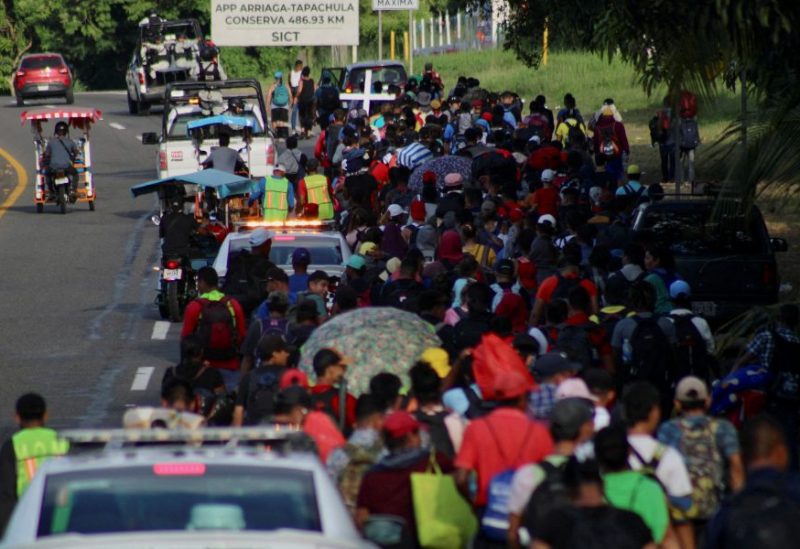
Migrants walk along the road in a caravan in an attempt to reach the U.S border, in Tapachula, Mexico November 5, 2023. REUTERS/Jose Torres
US Secretary of State Antony Blinken engaged in discussions in Mexico with the aim of addressing the escalating migration issue, which has emerged as a significant political challenge for President Joe Biden as he approaches an election year.
The unusual Christmas week trip by the top American diplomat was abruptly scheduled as the rival Republican Party presses Biden to crack down on migration as a condition for providing the votes in Congress for one of his key priorities — support for Ukraine.
Blinken held just over two hours of closed-door talks with President Andres Manuel Lopez Obrador and other top Mexican officials during the one-day visit.
Lopez Obrador, who spoke to Biden by telephone last week, said before the meeting that Mexico was “helping a lot” in addressing migration and would continue to do so.
“People leave their towns out of necessity and there’s a lot of economic and social crisis in the world. It’s necessary to further promote productive activities and job creation,” he said.
Around 10,000 people without authorisation are trying to cross the southern US border each day, nearly double the number before the pandemic, with a new caravan of hundreds if not thousands of people heading by foot since the past weekend.
“Nobody’s going to stop migration,” activist and caravan organizer Luis Garcia Villagran said, complaining that migrants were being treated as “currency” by the US and Mexican governments.
“A budget of billions of dollars is being settled right now to mitigate migration. With all the gold and money in the world, they cannot stop people seeking better living conditions,” he told reporters in southern Mexico.
Legal crossings affected
US border authorities have been so overwhelmed that they have suspended several legal crossings to focus on processing undocumented migrants.
Reopening those crossings “is a priority for us” given the close trade links between the two countries, Mexican Foreign Minister Alicia Barcena told reporters after the talks, which she described as “excellent.”
Blinken, whose trip is a break from months of focus on the Middle East crisis, was accompanied by Secretary of Homeland Security Alejandro Mayorkas along with White House homeland security advisor Liz Sherwood-Randall.
Mexico, under agreements with both Biden and his predecessor Donald Trump, has agreed at least temporarily to take in migrants seeking to cross into the United States.
The package proposed by Biden to Congress would also fund 1,300 additional Border Patrol agents to help address migration.
The Biden administration has warned that without a deal, Ukraine will soon run out of weapons needed to repel the nearly two-year-old Russian invasion.
On Wednesday, the US State Department announced what it said was the last remaining package of weapons available for Ukraine under existing authorisation and urged Congress to “act swiftly” to renew the flow.
However, Republican hardliners have shown little sign of compromise.
Trump, the frontrunner for the Republican nomination to challenge Biden next November, is again campaigning on stridently anti-immigrant rhetoric, accusing foreigners of “poisoning the blood of our country,” language that critics pointed out was similar to that of Adolf Hitler.
‘No magic wand’
Andrew Rudman, director of the Mexico Institute at the Wilson Center in Washington, expected Blinken to seek additional support from Mexico to keep migrants within its borders, such as temporary work permits.
“The Biden administration wants to show for its own domestic political reasons that they’re doing everything they possibly can,” he said.
“One of the challenges is that everybody wants a short-term solution to a global, long-standing problem,” Rudman said of migration. “There is no magic wand.”
Migrants have been fleeing Central American countries ravaged by poverty, violence, and disasters worsened by climate change.
In recent months there has also been an uptick in migrants heading through Mexico from Haiti, which has been devastated by gang violence and a lack of a functioning government, and from Venezuela, where basic goods have fallen in short supply after years of economic chaos.
Maria Alicia Ulloa, a Honduran who is part of the latest caravan, voiced fears that tougher US-Mexican immigration measures would mean returning to a country beset by crime and unemployment.
“We emigrate with the hope of giving a better life to our children, and a better life to the relatives who remain behind,” she said.